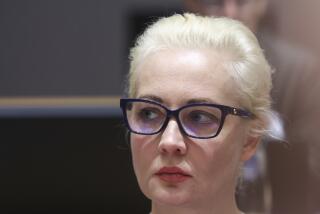Personal Portraits Unlock Russian History
- Share via
There’s a slightly flip tone to the title “Bye-Bye Babushka” that doesn’t prepare you for the impact of this warm and thoughtful documentary in which we are able to perceive Russia’s turbulent destiny through the lives of its older women. “Mother Russia” takes on fresh meaning as we meet a cross-section of elderly women, all of whom have lived long and grueling lives. Without such sturdy and steadfast women, it’s impossible to imagine Russia surviving so much brutal hardship.
Filmmaker Rebecca Feig has taken as her key figure Baba Marina, a doughty 91-year-old living in Varvarina, a village in central Russia. Unlike many of the women in the film, she is beyond politics; in her own view, “a simple farm worker,” who lost her husband and two children so early in life that she has lived most of her life alone.
Once the cook for a collective farm, Baba Marina lives in a modest cottage, harvests potatoes and retains her independence. She is eternal Russia, the enduring peasant, uneducated but wise. She acknowledges that she has been paid badly all her life, understands that she has no real chance to profit from the advent of democracy, but doesn’t complain, hoping only for an easy, quick death when her time comes. She is revered in her community, especially by its women, who have suffered losses almost as great as hers.
Most of the other key women in the film reflect a radical diversity in their views of Russia and its political history. Baba Tonya is a Muscovite, a Communist Party member since 1940, a profound admirer of Lenin and a staunch defender of the party line. She is representative of a large number of Russians who remain devoted to communism. Some are idealists, some are grateful for the food, shelter and social order the system provided, and they remain in denial about the horrors and ultimate failure of communism. But Feig does not judge them and instead reveals their humanity.
At the same time she does not back away from the grim reality that those women (and men) who were the least sophisticated and most unquestioning fared best under communism. She then introduces us to two intellectuals--Larissa, a professor of history, and Tamara, a professor of Marxism, who declares tartly that in the USSR totalitarianism was, in fact, passed off as socialism. Tamara, who says the system never succeeded in eradicating compassion from Russian women, and her husband, Pyotr, are hearty survivors.
But the film’s haunting presence, its conscience, is Larissa, whose participation in a protest of the Soviet invasion of Czechoslovakia in 1968 resulted in a four-year exile to Siberia. Her husband received a 10-year sentence merely for writing a letter in 1980 protesting the exile of Andrei Sakharov to Gorky; he died in prison during a hunger strike in 1985.
Astonished at the sudden collapse of the USSR, Larissa says that the “inner freedom” you derive from protest is always worth it--”even if it takes 300 years” for the cause of freedom to succeed.
Throughout, Feig deftly, sparingly incorporates archival footage celebrating the opportunities and glories communism holds for women. But as one old woman remarks wryly, “We are not women, we are horses.” Feig suggests that the selflessness of these women, irrespective of their political views, is a quality fast becoming passe in a changing Russia. Yet you have to wonder how it will fare without its babushkas.
* Unrated. Times guidelines: The film is suitable for all but the very young.
‘Bye-Bye Babushka’
(Farewell Grandmother)
A Persistence of Vision Film presentation. Director Rebecca Feig. Producers Feig, Mitchell Rosenbaum. Co-producer Ekaterina Skorik. Cinematographer Rosenbaum. Editor Daisy Wright. In Russian, with English subtitles. Running time: 1 hour, 20 minutes.
*
* Exclusively at the Music Hall, 9036 Wilshire Blvd., Beverly Hills, (310) 274-6869.
More to Read
Only good movies
Get the Indie Focus newsletter, Mark Olsen's weekly guide to the world of cinema.
You may occasionally receive promotional content from the Los Angeles Times.










